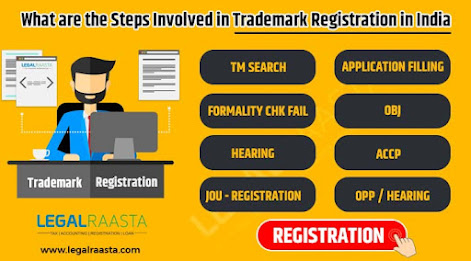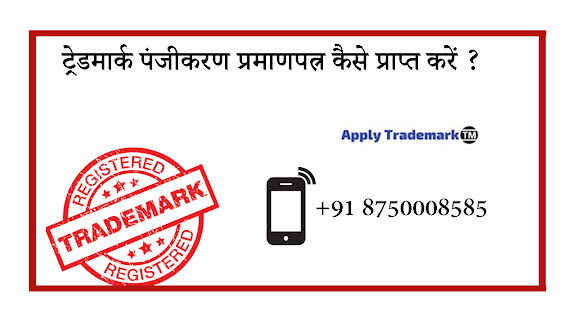How do I register a trademark in India and what are the costs?| |cost of registering a trademark in India
A trademark gives you the means to stop
someone from using your company as a prop and protects your brand. A trademark
can distinguish one person's goods or services from those of others, and it can
include the design of the product, its packaging, and a color scheme.
Furthermore, when you consider the advantages a company or brand receives, the
fees or cost of trademark registration is extremely low. Many people are
hesitant to register their trademark because they are concerned about the cost
because doing so would help protect the long-term reputation of their company.
The cost of trademark registration is broken down, which makes the overall sum
seem less excessive.
The breakdown of the trademark registration
cost will make the overall amount, which might seem a little high, more reasonable.
Before we discuss the Cost of Registering a Trademark in India, we're
going to demonstrate here in this blog how the LegalRaasta team will
assist you with the fundamentals of doing so.
What is a
Trademark Registration?
A trademark is a name or logo you use to set
your products apart from those of your rivals. The legal term for
"intellectual property" is "trademark." The Trade Marks Act
of 1999 establishes a legal process known as trademark registration. By
registering a trademark, also known as a logo or brand, you can prevent others
from using your brand or logo without your permission. Trademarks guarantee
that the characteristics of the goods and services will remain the same while
identifying their origin. It automatically promotes the products or services
and builds a favorable impression of them.
Process of Trademark registration in India
Step 1: Perform a Trademark Search: The applicant
must look for a trademark that is distinct from those of already-registered
marks. A company's or individual's trademark needs to be distinctive in order
to draw customers and be promoted easily. To find a trademark that is
distinctive from those already registered, the applicant must conduct extensive
research.
Step 2:
Application for Trademark Registration: The Registrar of Trademarks must
receive an application for trademark registration from the applicant. The
application must be submitted at the registrar of trademarks' corporate
headquarters or a regional office. The application is then formalized, checked,
and digitalized.
Step 3: Examining the application: After the
trademark application is submitted, the registrar of the trademark office must
designate a trademark examination officer to review it. The trademark
registration application will be approved if the examination officer is pleased
with it. However, the examination officer is required to issue a refusal order
for the application if he is not pleased with it.
Step 4: Publication: After the application has been
approved by the examination officer, he will publish it in the Trademarks
Journal for review. If no one objects within three months, the application is
accepted. Otherwise, the application is proceeded with.
Step 5: Registration certificate: The registered
trademark holder receives a trademark registration certificate following the
approval of the trademark application.
Documents required
for registering a trademark in India
•
Documentation demonstrating
that the proposed mark may be used in another nation must be included.
•
A power of attorney must be
signed and submitted by the owner.
•
A properly filled-out
application form must be submitted.
•
When applying for a sole
proprietorship business, the applicant's information, the proprietor's
identification (PAN card, Aadhar card, and other documents), and the
proprietor's identity (name, address, and nationality) may be submitted.
·
Businesses are required to
show proof of address.
•
The nature, goal, and
location of your business.
•
In the case of a
corporation, small business, startup, or other entity: MSME, COI, and, if the
business is a partnership firm, a partnership deed.
Registration
Costs for Trademarks
A trademark may be owned by any person,
company, or organization. Numerous businesses also submit trademark
applications for goods packaging or the actual product due to the fierce
competition and ongoing digitalization. Once the aforementioned steps have been
properly completed, filing the application might be one of the simplest. It is
comparable to laying the foundation for your home before you begin
construction. To avoid later objections from the trademark office, which is
something that comes with experience, it is crucial to include the correct
information in your application. The officials will collect fees for each
category and there will be separate fees for some elements, such as a
collection of marks and linked symbols.
•
Trademark Registration Fees: Government fees for trademark
registration in India are Rs. 4,500 per application per class for individuals,
startups, and small businesses and Rs. 9,000 per application per class for
everyone else. LegalRaasta professional fees are Rs. 1500/+GST per application
per class with a timeline of 1 day and registration can be completed in 6
months if the trademark is distinctive.
•
Trademark Objection Fees: When examining your application to register your trademark, the
trademark office may raise objections. These objections must be addressed and
complied with within one to two months of the date on which they were raised.
When the same is anticipated by your service provider during the classification
and trademark search, the majority of these objections can be avoided. This not
only lowers the cost of Registering a Trademark in India, but it also
expedites the procedure. Professional fees start at Rs. 1500 (+ GST) per
trademark, per class, and there are no official fees. The application
processing time is 1.5 to 2 years from the date of filing.
•
Trademark Renewal Fees: In India, a trademark renewal can be requested six months before it
expires. Your trademark rights are protected for an additional 10 years thanks
to the renewal. Our LegalRaasta Professional fees start at Rs. 1500 +
GST per trademark per class and go up to Rs. 9000 per class for official fees.
Conclusion
The intellectual property rights in trademarks
are created when a brand wants to set itself apart from competitors and give
its products a unique identity. A company or individual can obtain a registered
mark and protect their brand from market infringement by following the steps
and paying the fees involved in trademark registration, which are covered above
in the article. The above steps assist the company in registering its trademark
and protecting it from legal violations.
Anyone who uses a trademark without
permission is subject to legal action from the trademark owner. You can get a
good idea of the overall cost of registering a trademark in India from
the above-mentioned trademark registration fees. Despite the fact that the cost
of trademark registration in India may vary slightly depending on how many
trademark classes you are filing your trademark under, registering your
trademark has the advantage of preserving the reputation of your company. You
can get assistance with this from the LegalRaasta team. In order to
ensure a trouble-free registration process, it is also always preferable to use
professional trademark services.



.jpg)
Comments
Post a Comment